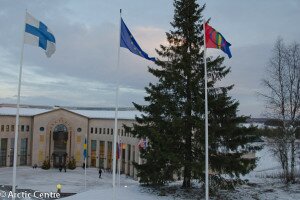
Flags outside the Arctic Centre in Rovaniemi, where the conference was held. Photo by Jani Kärppä/Lappi-kuva, Arto Vitikka/ Arctic Centre.
Gerda Kinell, a researcher in the Arctic Games project at Enveco Miljöekonomi AB reports on a high-level conference she attended in December, and the avenues for exploration opened up by Mistra Arctic Futures: Arctic Games.
- The conference “In spirit of the Rovaniemi process – Arctic cities, global processes and local realities” took place on the 2-4th of December 2013 in Rovaniemi, Finland. It was a very well organized and urgent Arctic conference that covered several themes such as extractive industries, tourism and indigenous people (see also the conference website). The conference was inaugurated by prominent speakers such as the Finnish Prime minister Jyrki Katainen and the former Norwegian Defense- and Foreign minister Thorvald Stoltenberg. I had the honor to give a presentation on “Arctic Games - Interactive development and application of a transdisciplinary framework for sustainable governance options of Arctic natural resources”, one of the research projects within Mistra Arctic Futures. The session was called “The Arctic in the global economy” and chaired by Professor Monica Tennberg. The presentation on Arctic Games was well received and the audience showed interest in the project’s approach of applying e.g. economic valuation and game theory in an Arctic setting.

The session on the Arctic in the Global Economy. Photo by Arctic Centre / Arto Vitikka
It was however obvious from the presentation in the session that Arctic Games has a different and more analytical approach than the descriptive research that is common in Arctic social sciences. For example, social and economic research presentations often describe the social and economic status and development of the Arctic by presenting descriptors such as GDP numbers, human development indexes, various statistics and ratios. Another presentation in the session “The Arctic in the global economy” covered e.g. transport infrastructure, strategic planning for Arctic cities, potential for gas and oil extraction and associated investments as well as associated environmental effects. Sustainability is a concept that is often used in this context but it is apparent that the interpretation of this word is very different between presentations. A sustainable investment is often interpreted in a financial context perceived as a long term source of income for the related region. Environmental and social effects are not primarily included in this assessment. Arctic Games however, is aiming at identifying development of Arctic natural resources that is sustainable from an economic and social perspective. The economic perspective in Arctic Games involves not only a financial analysis; it also includes effects on ecosystem services and distributional impacts. This is done by applying a cost benefit approach and economic valuation of Arctic ecosystem at risk. Such economic analysis has a broader view on effects of a given project, also covering changes in human well-being due to e.g. a changed provision of environmental services and changes in health. Sustainability is also brought in from a social perspective in Arctic Games by applying governance tools by e.g. analyzing decision-making structures and mapping of constitutional conditions. Game theory is another important tool in the project that is providing knowledge on how a decision is made and incentives for different outcomes. This provides information on the potential and conditions for reaching decisions that are sustainable for the region. The goal of Arctic Games is to build an analytical framework for assessing sustainable governance options of Arctic natural resources by using the components described above. My impression is that this kind of approach; to build theoretical models for explaining and analyzing Arctic social and economic issues is somewhat new and rare in the context of Arctic social sciences. I also think that a broad view on sustainability and effects affecting sustainability is crucial for reaching a desirable development of the region. This most likely will always imply a need of interdisciplinary and/or trans-disciplinary research.






